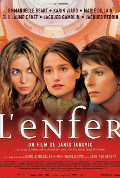
France/Italy/Belgium/Japan 2005
Directed by
Danis Tanovic
101 minutes
Rated M
Reviewed by
Bernard Hemingway

Enfer, L'
Synopsis: Three estranged sisters are brought together by unhappiness in love and find out about their past
Danis Tanovic's film is based on a script by Krysztof Kieslowski, developed before the latter’s death in 1996 with his longtime collaborator, Krzysztof Piesiewicz. It was intended as the second film of a Heaven-Hell-Purgatory trilogy based loosely on Dante's Inferno, the first of which, Heaven, with Cate Blanchett and Giovanni Ribisi was shot by Tom Tykwer.
Going by its films, no nation has a flair for the miseries of love like France. The home of Descartes, the father of modern rationalism, it flails obsessively with the irrationality of our sexual urges. Catherine Breillat’s Anatomy of Hell (2004), whose title neatly encapsulates the Gallic dilemma, has been the most extreme statement of innumerable variants on the theme expounded in French cinema over the years. Kieslowski, a Polish Catholic, found his spiritual home in France, so much so that his best-known work, the Three Colours trilogy, alludes to the French flag. Although much-loved in certain quarters I’ve never found his work engaging, as for the most part stylistically it exemplifies the glossy star-studded, designer-chicness that characterizes so much of upmarket French film product which tends to self-consciously illustrate some moral thesis in a contemporary form involving fashionably unshaven men and leggy women in short skirts.
Tanovic's Hell follows these precedents closely. It’s very slick with the usual resonant Parisian exteriors and plenty of male stubble and female jambe, including a gratuitous breast-baring from the extensively collagen-and-silicone-enhanced Emmanuelle Béart (who at 43 doesn’t look greatly different to when she started in film 20 years ago). It’s also very superficial beneath its supposed anguish and explicit literary reference, which in this case is to Euripides' Medea (with Carole Bouquet playing her contemporary equivalent). Yes, the notion of three sisters who are all unhappy in love because of a pivotal incident in their childhood is a potentially interesting one but here the illustrative tendency kills any dramatic conviction. Only one sister, Celine (Karin Viard), comes across with any degree of believability. The other two are simply too gorgeous to take seriously as desperately anguished about their, respectively unfaithful, fashion photographer husband and older professor lover – clichés of French film if ever there were ones. And when Celine’s apparent stalker provides the plot twist that brings everything together it is too contrived to have any effect other than to make one feel one has been led up the garden path.
If the film has anything memorable it is its Ozon-like allusive asides to elemental verities like the fledging fallen out of its nest that appears at the beginning of the film. Unfortunately Tanovic does not manage to invest his main story with a comparable poignancy.

Want more about this film?


Want something different?




